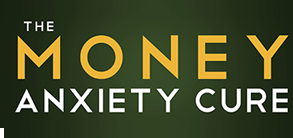Material possessions come and go. The more you have, the more you have to worry about losing. The harder you work, creating these material goods, the more you potentially lose in quality time with those with whom you could share your love. Suddenly, you’re at the end of your life and you’ve missed it. I call this deferred living. Wants beget wants. I want, therefore I am… or will be.
When we can feel wealthy and prosperous, regardless of the ups and downs of the market place, or the external circumstance around us, then we are truly wealthy and free. Now mind you this is easier said than done. It’s a ongoing practice of staying aware of our habitual conditioning, actions, words, investments, spending habits that either create more peace and joy in your lives and the world (add to our prosperity account) or take away from this account. Generosity is the ultimate spiritual practice.
In Chapter 9 of ‘The Money Anxiety Cure’ I discuss The Practice of Skillful Generosity
This is one of the reasons that all Buddhist teachings are provided on a dana (donation) basis. The practice of giving is universally recognized as one of the most basic human virtues, a quality that testifies to the depth of one’s humanity and capacity for self-transcendence. I recall traveling in Thailand and Laos and seeing the monks going on alms rounds with their bowls empty, ready to receive whatever generosity would come their way by the local villagers who themselves are often very poor. The monks always take what is offered, and the villagers give what they can. The villagers know that the good merits they are creating by supporting the monks cultivate Right Understanding in their own spiritual practice.
In its most simple form, my financial advice to clients always starts with “find a way to give.” Regardless of whether you have money or not, be generous.
- I like the Buddha’s rule of thumb about giving: if you have little, give a little. If you have a lot, give a lot. Avoid being miserly. You can have little in terms of material possessions (like mother Theresa), but still give a lot. You don’t have to give money. You can give or your time or skills.
- Random acts of generosity: Use your skills and resources to help someone you hardly know, or even a stranger. Why? Most of us have something that we are good at, and sharing this with someone outside our immediate circle of friends can make a big impact.
- Be generous even if you have no money or you are in pain: Sometimes I feel too empty to be a teacher, but I show up anyway. My students appreciate my showing up and being real, and I appreciate being met by folks that I regard also as my teachers.
